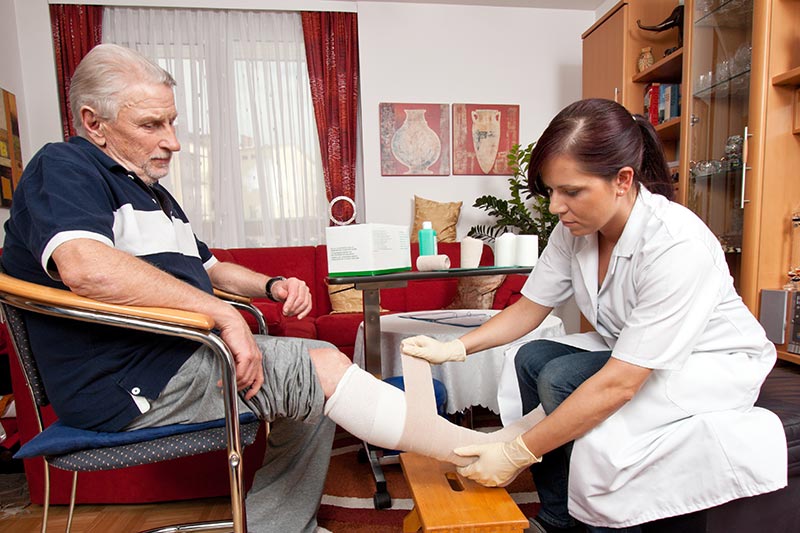The Role of Home Nursing in Managing Diabetes and Hypertension
- Health & Fitness
 royalclinic
royalclinic- October 11, 2024
- 4

Managing chronic conditions like diabetes and hypertension can be challenging, especially for individuals who require ongoing care and monitoring. Home Nursing Services in Dubai have become a valuable solution for managing these diseases, providing patients with professional, personalized care in the comfort of their own homes. This approach not only reduces the burden on healthcare facilities but also ensures that patients receive consistent, high-quality care tailored to their needs. In this article, we will explore the role of home nursing in managing diabetes and hypertension, and how it can lead to better outcomes for patients.
Introduction to Home Nursing Services:
Home nursing services involve healthcare professionals, such as registered nurses, visiting patients in their homes to provide medical care, support, and education. These services are designed to help individuals manage chronic conditions, recover from surgery, or maintain overall health and well-being. For patients with diabetes and hypertension, home nursing can be a critical component of their disease management plan.
Home nursing services offer personalized care, allowing for one-on-one attention that may not be available in traditional healthcare settings. Nurses can monitor vital signs, administer medications, provide education on lifestyle changes, and offer emotional support, all within the familiar environment of the patient’s home.
Diabetes Management Through Home Nursing:
Continuous Monitoring and Assessment:
One of the primary benefits of home nursing for diabetes patients is continuous monitoring. Nurses can regularly check blood sugar levels, assess symptoms, and track progress to ensure that the patient’s condition is stable. This ongoing assessment helps detect potential complications early, reducing the risk of severe health issues like diabetic ketoacidosis or hypoglycemia.
By monitoring a patient’s blood glucose levels and ensuring they remain within the target range, nurses can provide immediate interventions if necessary. This level of continuous care helps patients avoid emergencies and hospitalizations.
Medication Management:
Many people with diabetes rely on insulin or other medications to manage their blood sugar levels. Home nurses can assist with administering insulin, adjusting dosages, and ensuring that the patient follows their medication schedule correctly. Proper medication management is crucial in preventing complications like high blood sugar (hyperglycemia) or dangerously low levels (hypoglycemia).
Nurses can also work closely with doctors to monitor the effectiveness of prescribed medications and adjust the treatment plan if necessary, ensuring that the patient remains on track in managing their diabetes.
Education and Lifestyle Support:
Effective diabetes management requires more than just medication; it involves significant lifestyle changes, such as maintaining a balanced diet, regular exercise, and weight management. Home nurses play a vital role in educating patients and their families on how to make healthier choices.
Nurses provide guidance on meal planning, portion control, and carbohydrate counting, which are essential for controlling blood sugar levels. They can also help patients develop an exercise routine that is safe and appropriate for their condition, which is critical in preventing complications and improving overall health.
Hypertension Management Through Home Nursing:
Blood Pressure Monitoring:
Like diabetes, hypertension (high blood pressure) requires continuous monitoring to ensure the condition is under control. Home nurses regularly measure a patient’s blood pressure and monitor trends over time. This data helps healthcare providers adjust treatment plans as needed to prevent complications like heart attacks, strokes, and kidney damage.
Home nursing allows for frequent monitoring without requiring the patient to visit a clinic or hospital, which can be particularly beneficial for elderly patients or those with mobility issues. Regular blood pressure checks at home provide a more accurate picture of a patient’s condition, as it eliminates the “white coat effect,” where blood pressure spikes in a clinical setting due to stress or anxiety.
Medication Compliance and Adjustment:
Managing hypertension often involves taking multiple medications, including diuretics, beta-blockers, or ACE inhibitors. A home nurse ensures that the patient adheres to their prescribed medication regimen and helps manage any side effects that may arise. They also track the effectiveness of the medications and report any concerns to the patient’s doctor.
By overseeing medication compliance, home nurses reduce the likelihood of missed doses or incorrect medication use, which can have dangerous consequences for hypertension patients. In some cases, the nurse may need to work with the physician to adjust medication dosages based on the patient’s blood pressure readings and overall response to treatment.
Dietary and Lifestyle Guidance:
Lifestyle changes are a critical component of managing hypertension. Home nurses educate patients on reducing salt intake, managing stress, and incorporating regular physical activity into their daily routine. These changes are essential in helping patients lower their blood pressure and maintain a healthier lifestyle.
In addition to dietary guidance, home nurses provide emotional support, helping patients manage the stress and anxiety that often accompany chronic conditions. They can also educate family members on how to create a supportive environment that promotes the patient’s well-being.
Benefits of Home Nursing for Chronic Disease Management:
Personalized Care:
One of the most significant advantages of home nursing is the personalized care patients receive. Nurses can tailor their approach to meet the unique needs of each patient, ensuring that they receive the best possible care for their specific condition. This individualized attention helps improve patient outcomes and satisfaction.
Convenience and Comfort:
For many patients, especially the elderly or those with limited mobility, traveling to a healthcare facility for regular check-ups can be burdensome. Home nursing eliminates the need for frequent trips to the doctor, allowing patients to receive care in the comfort of their homes. This convenience can lead to better adherence to treatment plans and overall better health outcomes.
Early Detection of Complications:
By providing regular monitoring and assessments, home nurses can detect potential complications early, allowing for timely intervention. This early detection is crucial in preventing serious health issues and avoiding costly hospitalizations. For both diabetes and hypertension patients, early intervention can significantly improve their quality of life and reduce the risk of long-term complications.
Emotional and Mental Health Support:
Living with chronic conditions like diabetes and hypertension can be emotionally challenging. Home nurses offer not only medical care but also emotional support, helping patients cope with the stress and anxiety that often accompany these diseases. This holistic approach to care is essential in promoting the overall well-being of the patient.
Conclusion:
Home nursing plays a critical role in managing chronic conditions like diabetes and hypertension. By providing continuous monitoring, medication management, lifestyle education, and emotional support, home nurses help patients maintain better control over their health. This personalized, convenient care model improves patient outcomes, reduces the risk of complications, and enhances overall quality of life. For individuals living with diabetes and hypertension, home nursing offers an invaluable resource for managing their condition and maintaining long-term health.



